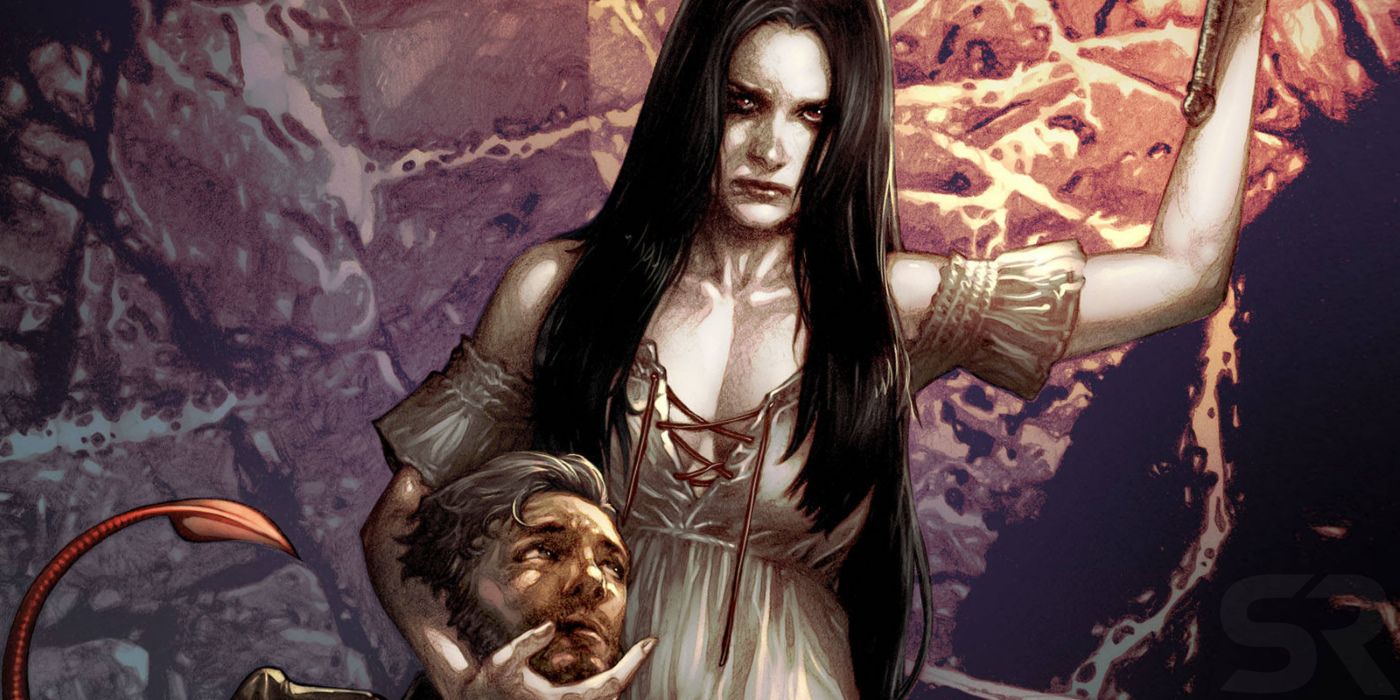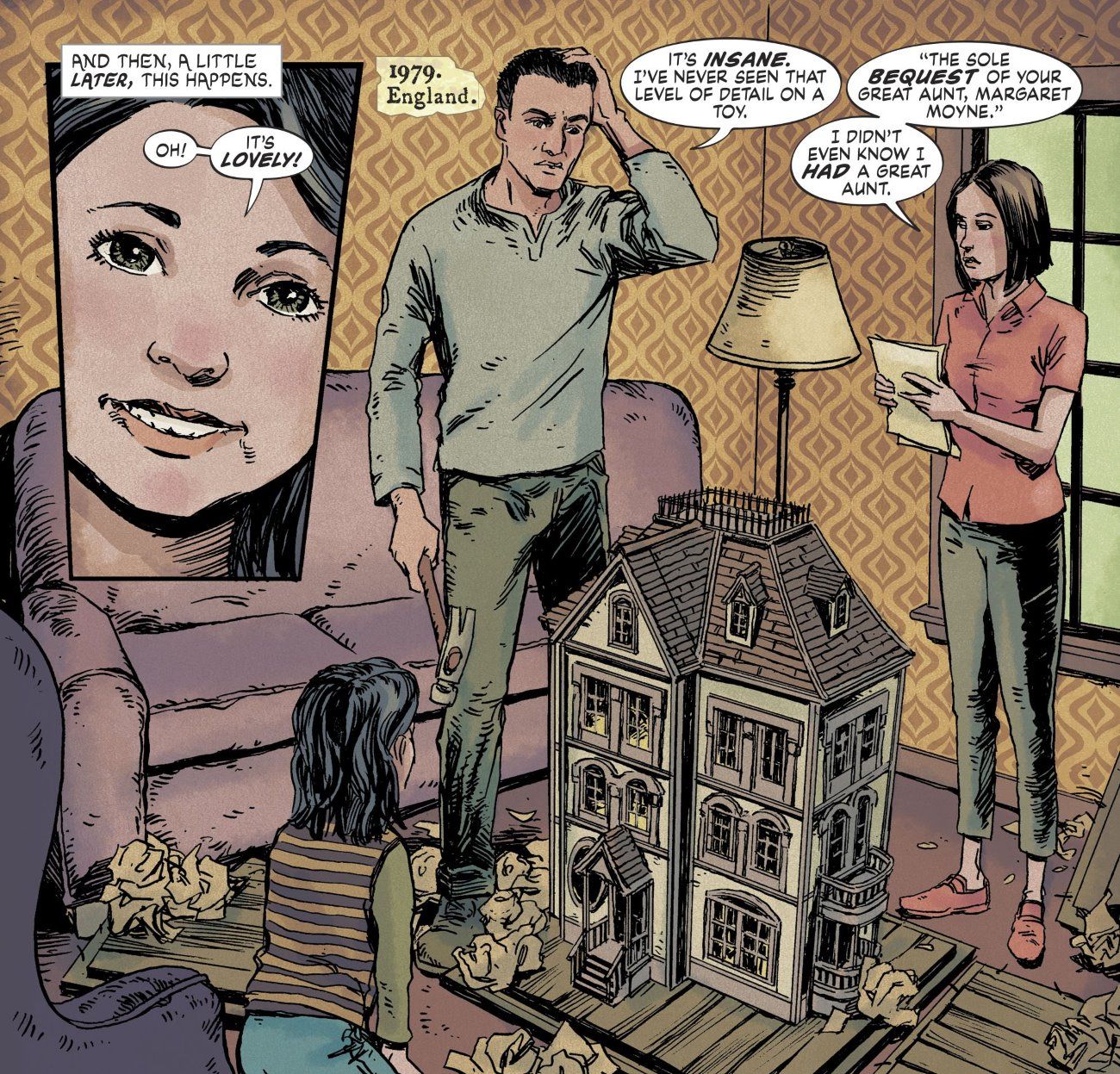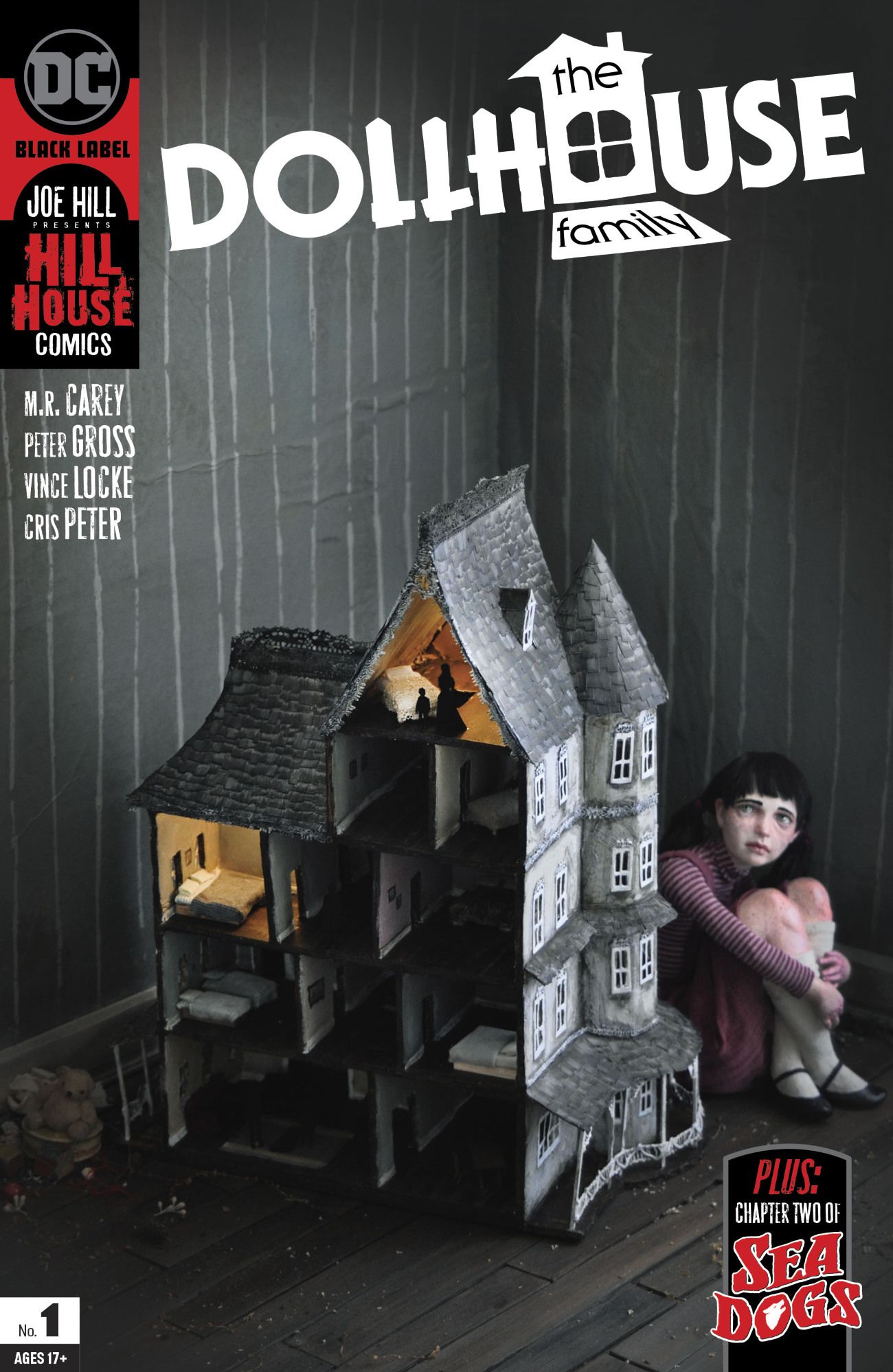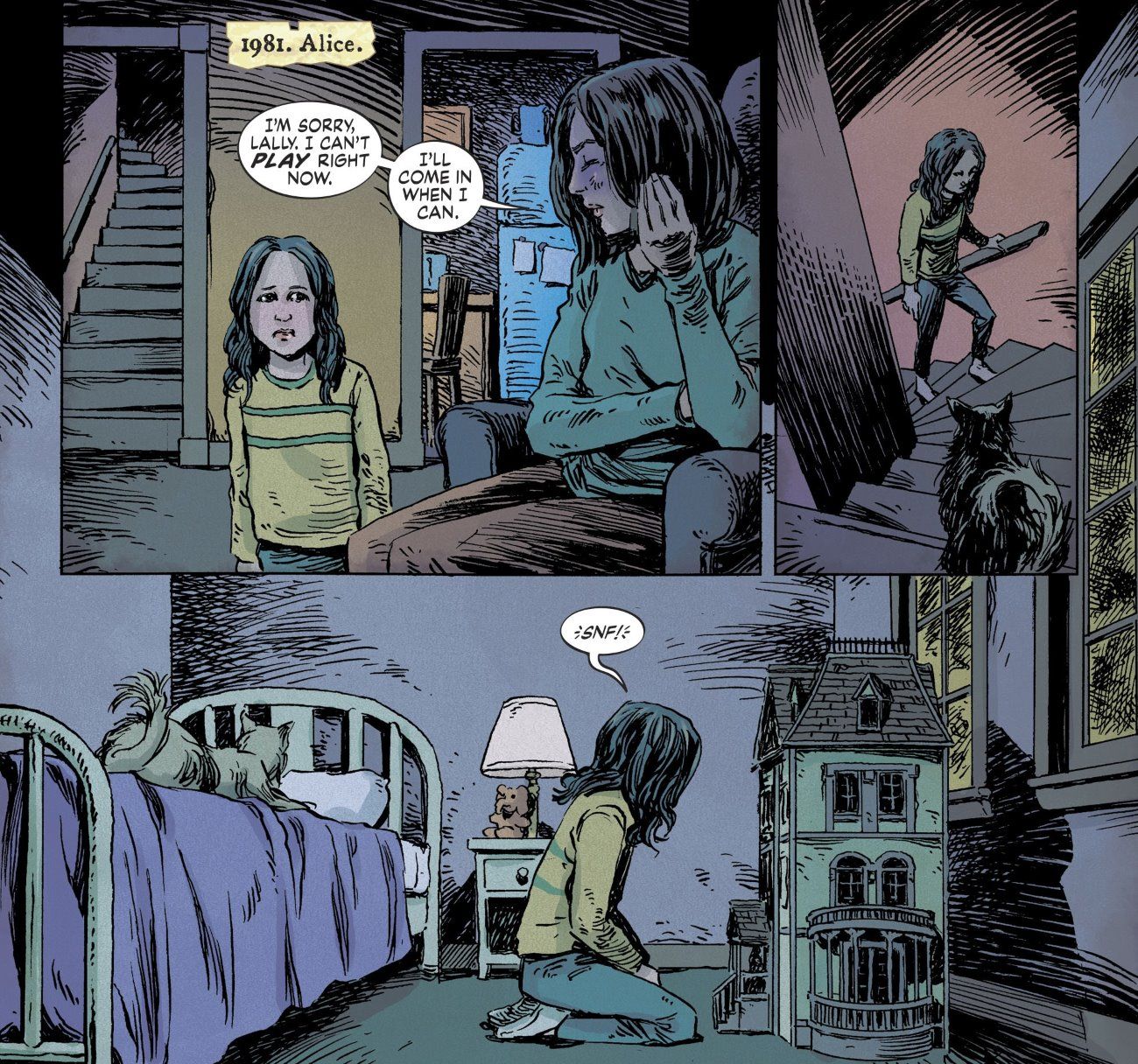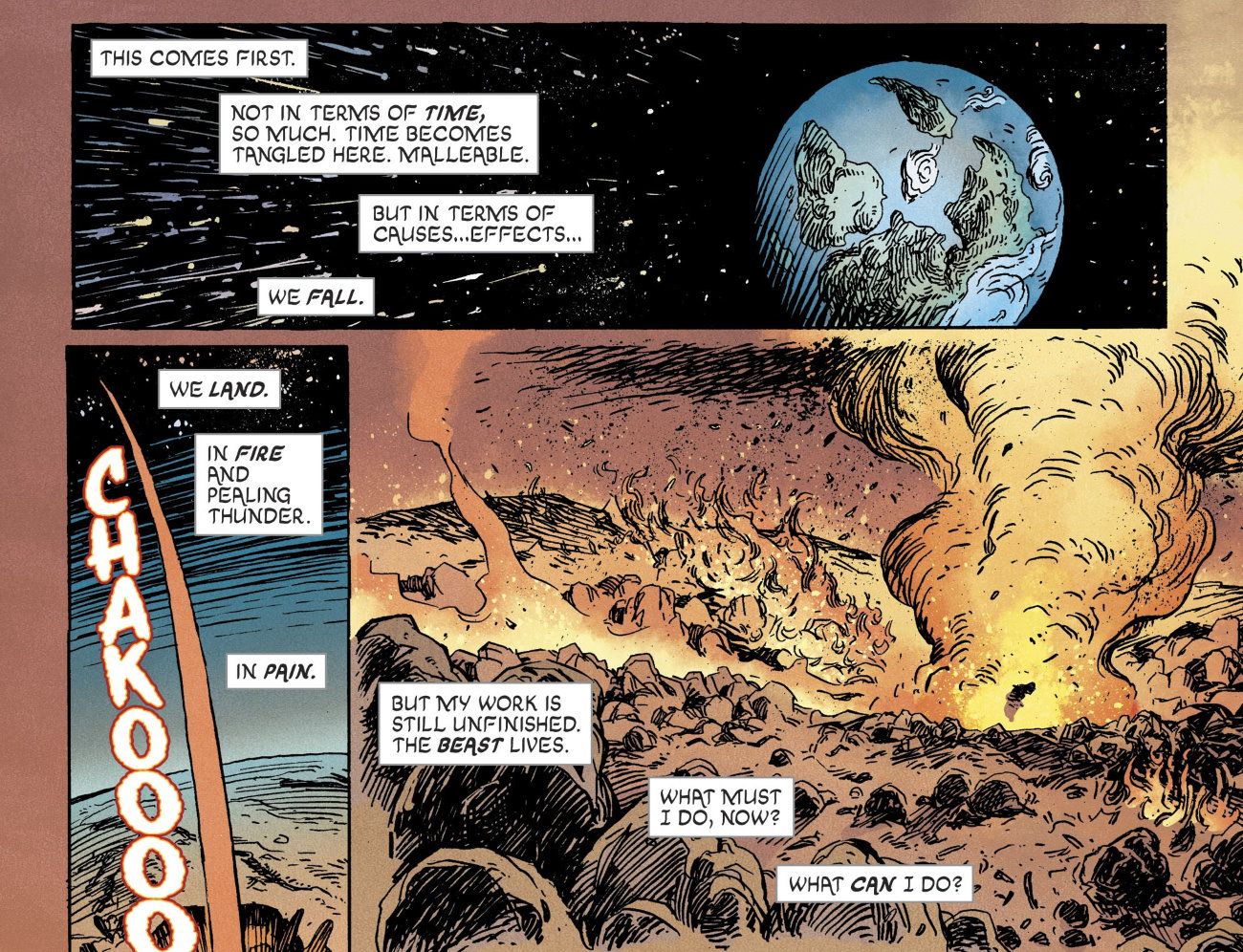When a young girl named Alice receives a birthday gift from her dying great-aunt, the results are just one more brand of horror coming to DC's Hill House Comics. And when the inhabitants of Alice's new plaything star to make themselves known, the story of The Dollhouse Family officially begins.
Screen Rant had the chance to speak with longtime collaborators Mike Carey and Peter Gross (Highest House, The Unwritten), providing the writing and layouts/pencils for Dollhouse Family (with additional art by Vince Locke). We discuss the inspiration and approach to bringing their most horrifying vision yet to Hill House Comics. A story that echoes into millennia past, into Alice's tormented present, and the threat of darkness... in 'The Black Room.'
The entire project of Hill House Comics was detailed at San Diego Comic-Con, but now we are in the thick of it, with Dollhouse Family now on store shelves. Was it clear early on that this was going to be a different kind of venture, with Joe Hill gathering together a wide variety of writers and artists?
Mike Carey: I came on board first, and Joe mentioned it to me as a possibility when we did a signing together for a prose anthology last year in London. He basically said, 'It’s going to be a curated line of books.' That he was looking for a flavor that was a little bit like Blumhouse horror movies. He was going to be in charge of overseeing the line, and he invited the pitch. I sent in a one-pager and we shaped it together. The whole time, he was talking about his own book, well his own two stories actually, and about the other stories that were coming in. There was a lot of back and forth. I think it’s very much got his personality stamped on it. Without that in any way restricting the choices that we made, and our creative freedoms. It felt like he was always there as a sounding board and it felt like the stories grew together in an organic way. So, I think the line will have a really distinctive identity – it will have its own DNA.
Is that a process you're used to, in how you typically develop stories?
MC: Not really. I mean, it felt like there was one more seat at the table in a way. Because normally you pitch to an editor and that editor is really your single point of contact. Obviously their answer will go to other people within the organization. But you’re not involved in that bigger conversation. This time it felt like there were a group of us sitting around with Joe kind of like, orchestrating the whole thing, and making sure that the stories grew together in a way. Not that they actually explicitly call out to each other or refer to each other, although there are a couple little Easter eggs, but it’s just a single aesthetic if you like.
So while you were in that process, was there another invisible chair at the table that Peter was sitting in, with you knowing he was going to be your choice for bringing this to life on the page?
MC: [Laughs] Yeah, damn straight. I always wanted to do it with Peter. I was always hoping that he would be free to say yes.
Peter Gross: Yeah, I wasn't asked, I wasn’t really looking into this at first. Mike and I had talked on Twitter about doing a Mazikeen prequel [a character from Neil Gaiman's Sandman]. And Neil had said, 'Oh that’s a great idea.' So we hadn’t been doing anything at DC and we actually started talking to them about that, and that just didn’t quite come together and at that point, I think Mike, you had gone further along with the Hill House stuff. So you said, 'Do I want to take a read of it?' And I did. And it was great. [Laughs]
Yeah it's sounding like this was a case of you knowing immediately that you just had to sign on.
PG: I kind of read it with the idea that like, 'I have been thinking I want to go off and do my own thing.' So, it’s like, I read it not wanting to like it.
MC: [Laughs]
PG: And then damn it, I do. You know? Like, 'Yeah this would be fun to do.' I was saying before to someone that I've had some hand trouble the last couple years, so I was only slowly sticking my foot back into working monthly. Which is why I’m just doing layouts on this and Vince Locke is doing finishes. I didn’t think I could handle the speed, and we really love Vince’s finishes.
It feels like this is a throwback kind of horror from the very first pages. It all seems so innocent, and kind, with this dollhouse. Obviously that has very powerful imagery, and the cover artwork alone sells itself on the type of horror. Was that a style you had been looking to work in?
MC: Well, I guess there were a couple of things that came together. One of them is the idea of scary architecture. A lot of my favorite horror stories are set in places, or with a strong sense of place that is a really important part of a narrative. I’m a big fan Danielewski’s House of Leaves, for example. Where one of the most terrifying beats is someone measuring a wall and finding that it is a little bit too long – that the measurements don’t match up internal and external. I love playing with place as a dimension in a narrative, especially in a horror narrative. But also, the fact that it’s a dollhouse doubles down on that because you’ve also got the kind of, uncanny valley effect of people – but they’re not people. They kind of attract us and freak us out in about equal measure.
But I think in terms of structure, we planned it from the start as a story that would open out in stages, that would seem to be one thing and then would become another thing; getting bigger with each. I think that there is at least one big kind of reversal, a big reveal and surprise in each issue. So the story keeps on sort of, like, you discover a new room of the house each time. A new aspect of the story.
PG: Can I ask a question?
Yeah, please!
PG: Which came first for you, the dollhouse or the family?
MC: The dollhouse came first. You’ve read the whole thing now and you know what the ultimate big reveal is. So I started with the house. The sort of 'true nature' of the house. And I worked backwards from there and I sort of constructed the family to fit in with that narrative.
PG: I think in a lot of your stuff there’s that great feel of people bonding with other people, you know? Or, almost like forming... looking for family, looking for support. I think it was there in Lucifer and it's there in The Unwritten. You know, the importance of that.
MC: Yeah, that is a theme I keep coming back to. I think it’s – sorry, we’re kind of hijacking the interview here.
PG: [Laughs]
No no, please.
MC: It’s something I love about both Joe’s writing, but it is quite easy to do emotionally cold alienating horror – it’s a tougher call to write generous horror. To write horror that is kind to its characters, and lets you care about its characters, and I think he pulls that off every time and it’s something that I was sort of aspiring to do here.
Was that part of the initial idea? Alice is such a vulnerable character, it instantly adds an element where the nicer this dollhouse family is to her, the more I'm biting my nails. Is that a fundamental part of the horror?
MC: I think it is, yeah. I think children in horror can either be a surrogate for the viewer – in which case you’re terrified for them. Or they can be, you get the spooky kid and then you’re terrified of them. The kind of ghost child or witch child that we see so often in far-eastern horror. But I think from Henry James onwards, I think putting a child into a horror narrative immediately raises the stakes whichever way you play it.
I do have to ask Peter, because you mentioned the layouts. I know it can sound a little silly to draw a comparison between a comic book page and a dollhouse, but it really does feel as if there are times I feel I'm looking into Alice's house the same way she's looking in on the dollhouse family...
PG: Ooh I’m impressed!
Was that the intention you had?
PG: That was absolutely intentional, yeah. And I wanted it to be really subtle, so now you’re giving it all away to everybody. Yeah. Definitely, we’re all kind of in a dollhouse too. I tried to take some angles and do some framings, like the rooms are holding us in. Yes, that’s definitely an intent.
Now I'm curious how that plays into the OTHER side of this story, which is a millennia-old horror narrative playing out alongside the modern day. Is that dichotomy between the mundane and the ancient horror the way it was originally conceived?
MC: Well from a story point of view, I think there’s one common thread which is the claustrophobia. All of these settings are sort of enclosed in one way or another. But starting out with those three different time lines -- millions of years ago, and then two centuries ago, and today -- that was very deliberate. The timelines are meticulously plotted, well more meticulously for me anyway. The way they all come together, I hope, will be quite surprisingly. Quite unexpected. There are correspondences through reveals that will come together gradually, and sort of accelerate towards the big reveal right at the end of the story. It operates on a lot of different scales, and there's a nesting within those scales and there are kind of echoes across the different timelines. They were initially quite challenging to set up, but were then played out in ways that worked I think, they worked very well.
PG: I was intrigued. I wasn’t sure, like 'Is this the best story choice to basically go with on page one?' There is a way you could have told this story and that would be a slow reveal, you know? That there’s these ancient entities. But just throw it out there, page one, it was a really interesting choice for me, and to see how it plays out in the story. I think it’s kind of the opposite of standard stories, so that was a great choice.
I won't say that it's a luxury, or a benefit, but with the overall premise of Hill House Comics, you can assume that at least more readers will be picking up a first issue planning to read the story the whole way through. As opposed to the demands of a typical first issue that has to sell and ongoing series. This is almost like chapter in a book, it feels like. Do you approach the structure differently because of that?
MC: I think you do approach it differently, yeah. I think we were very consciously setting up things that would pay off short term within the issue, and then things that would pay off longer-term in the next issue, and the issue after that, and so on. In a sense, you’re pacing it in your mind as you go, with a view to concatenating those effects. I think it helped that the last thing Peter and I did together was Highest House, which similarly was a finite story that kind of functioned in a novelistic way. I think we got into that rhythm and I think we enjoyed being in that rhythm, and in some ways I feel that we are doing something similar here. Would you agree Peter?
PG: Yeah, I would definitely agree. And I think over the years, first issues have become a lot more challenging. I think there were times when I was working in comics at Vertigo where the numbers were so guaranteed, that you knew you had time to develop things slowly or differently. And even when we did Unwritten, I remember we agonized a lot, you know, because we knew numbers were down. We agonized a lot over making sure that we did 'first issue things.' And I think now that’s just a given. You've got to structure it... the audience does not forgive. And if there is anything that they don’t like, or if they feel like you don’t know what they’re doing with the story, I think they are just going to dump it right away. But I think that almost unstated now, you know what I mean? You gotta strike quick.
Well I really enjoyed the first issue, and you delivered such an incredibly satisfying ending to this first issue. Although I don't know what that says about me.
MC: [Laughs]
PG: [Laughs] Yeah, it was a great last page. Yeah, definitely.
The Dollhouse Family #1 is available now from your local comic book shop.

